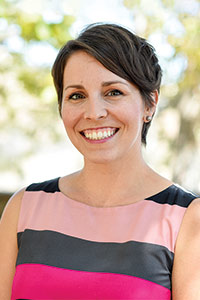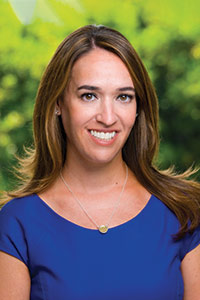Mother Knows Best
A team of Seaver College faculty and students investigates the benefits and consequences of social media groups for moms
 Lauren Amaro’s 1-year-old son was battling eczema and asthma when she sought support
through online groups for parents experiencing similar issues. While some of the information
she came across was useful, Amaro’s glimpse into the lives of other moms, and the
strategically curated phrases and photos that floated throughout their comment threads,
left her questioning her own mothering instincts. Between visits to numerous pediatricians,
allergists, and dermatologists, the first-time mom and assistant professor of communication
at Seaver College found herself trapped in a vortex of social media communities overloaded
with criticism and advice.
Lauren Amaro’s 1-year-old son was battling eczema and asthma when she sought support
through online groups for parents experiencing similar issues. While some of the information
she came across was useful, Amaro’s glimpse into the lives of other moms, and the
strategically curated phrases and photos that floated throughout their comment threads,
left her questioning her own mothering instincts. Between visits to numerous pediatricians,
allergists, and dermatologists, the first-time mom and assistant professor of communication
at Seaver College found herself trapped in a vortex of social media communities overloaded
with criticism and advice.
After sharing her experiences with Theresa M. de los Santos (’01, MA ’08), associate professor of communication and a new mom at the time, Amaro discovered that her feelings of inadequacy and isolation while seeking social media support were not uncommon.
“I found myself sometimes struggling to trust my judgment while so many moms had such a range of differing opinions,” recalls Amaro, who couldn’t help but compare her approaches to her son’s healthcare with that of other moms online.
Driven by a curiosity to better understand the ways in which communication impacts family dynamics and a shared desire to improve the social media experience for moms, Amaro and de los Santos conducted three separate studies to examine the emotional and relational influence of interactions with online communities focused on parenting. To incorporate a psychological perspective, particularly the biopsychosocial framework, the two approached Nataria Tennille Joseph, assistant professor of psychology at Seaver College, to join their endeavor.
Insecurity Measures
In the inaugural study “Social Comparison and Emotion Across Social Networking Sites for Mothers,” the results of which were published in the May 2019 edition of Communication Reports, three undergraduate research assistants analyzed 984 individual posts and 1,730 associated comments written in Facebook groups, blogs, and forums for moms.
Based on the results, the team concluded that the most common topic presented across the platforms was the role of the mother, particularly expectations of motherhood, and that in most instances, mothers demonstrated downward social comparisons—expressing superiority after comparing themselves to those they believe to be inferior mothers.
 Through the content analysis, the researchers discovered that each social communication
platform offers a unique benefit. For example, informational inquiries are best conducted
on Facebook where moms typically post questions about the best baby products, such
as strollers and educational toys. Blogs tend to offer a sense of emotional support
and encouragement for those not necessarily interested in answers to specific questions.
Forums, on the other hand, provide a sense of whether certain parenting techniques
or children’s behaviors are considered typical.
Through the content analysis, the researchers discovered that each social communication
platform offers a unique benefit. For example, informational inquiries are best conducted
on Facebook where moms typically post questions about the best baby products, such
as strollers and educational toys. Blogs tend to offer a sense of emotional support
and encouragement for those not necessarily interested in answers to specific questions.
Forums, on the other hand, provide a sense of whether certain parenting techniques
or children’s behaviors are considered typical.
From the results of this study and others, the professors recommend the development of media literacy courses for moms that educate them on how to best use these sites to maximize social support benefits and minimize harm.
In their next study, the professors shifted their focus to asking moms about what they observed on the social networking sites. They conducted a national survey of 336 moms of children between the ages of 6 months to 5 years in order to examine their social media experiences in relation to social comparisons, feelings of belonging, negative emotions, and parenting satisfaction.
Published in the May 2019 edition of Journal of Family Communication, the study suggests that while downward social comparison does not directly cause moms to second-guess their parenting skills, it is a related component of mothers’ parenting insecurity.
Women who practice downward comparison are in these groups to feel a sense of belonging by inflating their own parenting satisfaction,” explains Amaro. “But the moms who look at other women and feel like they don’t measure up primarily feel negative emotions and discount their parenting abilities and satisfaction.”
As she puts it, “If you’re getting support online versus support from your spouse, parents, or friends you know, love, and trust, then you are likely missing the multiple benefits that come from face-to-face relationships, like lower stress levels through physical affection. By overly investing in digital relationships, women may experience more of the negative emotions that directly influence mental and physical health.”
So why do women keep turning to these sites for knowledge and reassurance? According to de los Santos, one reason might be a fear of missing out. “You know it makes you feel bad, but at the same time the cultural expectations of your child keeping up with socially determined milestones compels many moms to continue using the sites and groups to see what the latest trends and activities are,” she explains. “You stick with it to remain in the know.”
Checks and Balances
 In a new, third project spearheaded by Joseph, the team began collecting data in spring
2019 for a study that measures cortisol levels in the saliva of moms in the greater
Los Angeles area with children between 6 months and 5 years old as they participate
in social media parenting groups. Recruited with permission through posts in Facebook
mom groups, the women are required to use an app that reminds them to check in four
times a day over the course of four days. At each check-in, moms use the app to document
the nature of their most recent social media interactions about motherhood and how
these interactions made them feel while simultaneously collecting a sample of their
own saliva to be later examined for cortisol, a stress hormone with health implications.
In a new, third project spearheaded by Joseph, the team began collecting data in spring
2019 for a study that measures cortisol levels in the saliva of moms in the greater
Los Angeles area with children between 6 months and 5 years old as they participate
in social media parenting groups. Recruited with permission through posts in Facebook
mom groups, the women are required to use an app that reminds them to check in four
times a day over the course of four days. At each check-in, moms use the app to document
the nature of their most recent social media interactions about motherhood and how
these interactions made them feel while simultaneously collecting a sample of their
own saliva to be later examined for cortisol, a stress hormone with health implications.
The ongoing study, funded jointly by the Seaver College Academic Year Undergraduate Research Initiative, the Cross-Disciplinary/Interdisciplinary Undergraduate Research Program, and the Dean’s Research Grant, thus far suggests that moms who were recently engaged in negative social comparison to other moms on social media indeed have higher cortisol levels in those moments.
Joseph contends that it is critical to maintain a balanced outlook. “Sometimes seeing mothers who are performing well in this role can inspire other mothers and give them the information they need in order to perform their own roles better,” she explains.
For women who seek support through online mom groups, Joseph advises that they interact with social media in an informed manner and find an environment that gives them more positive than negative responses in order to prevent stress-related health outcomes.
“Mothers don’t have to completely disconnect from social media because it’s not all bad,” she says. “But they should be selective and intentional about which sites they visit.”
